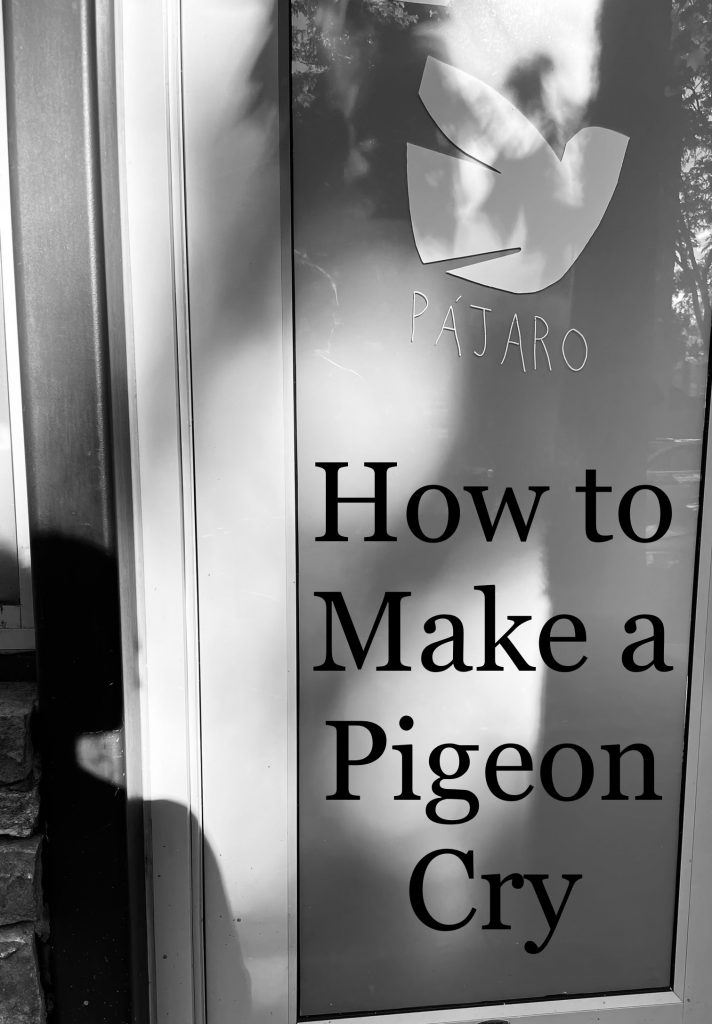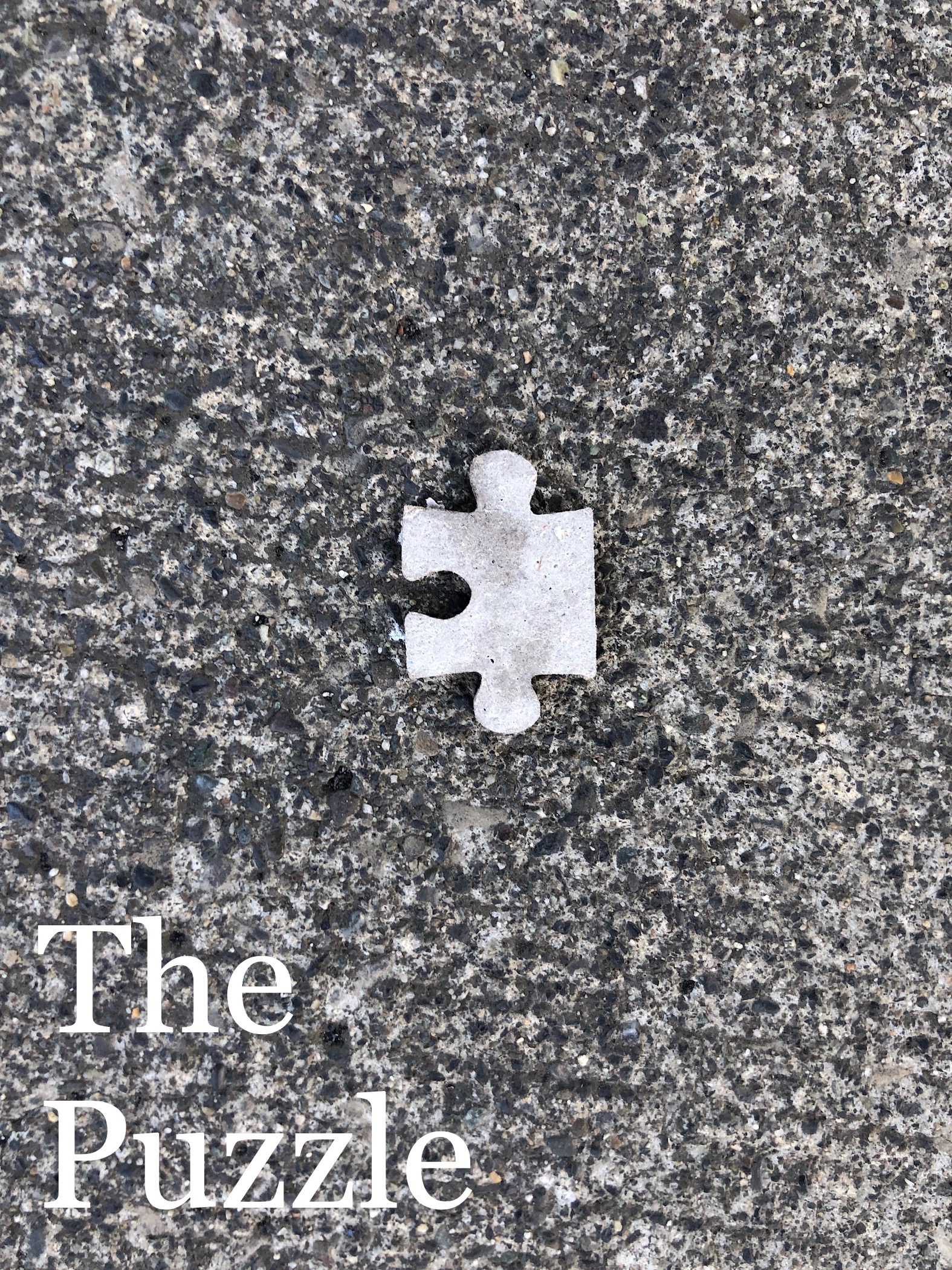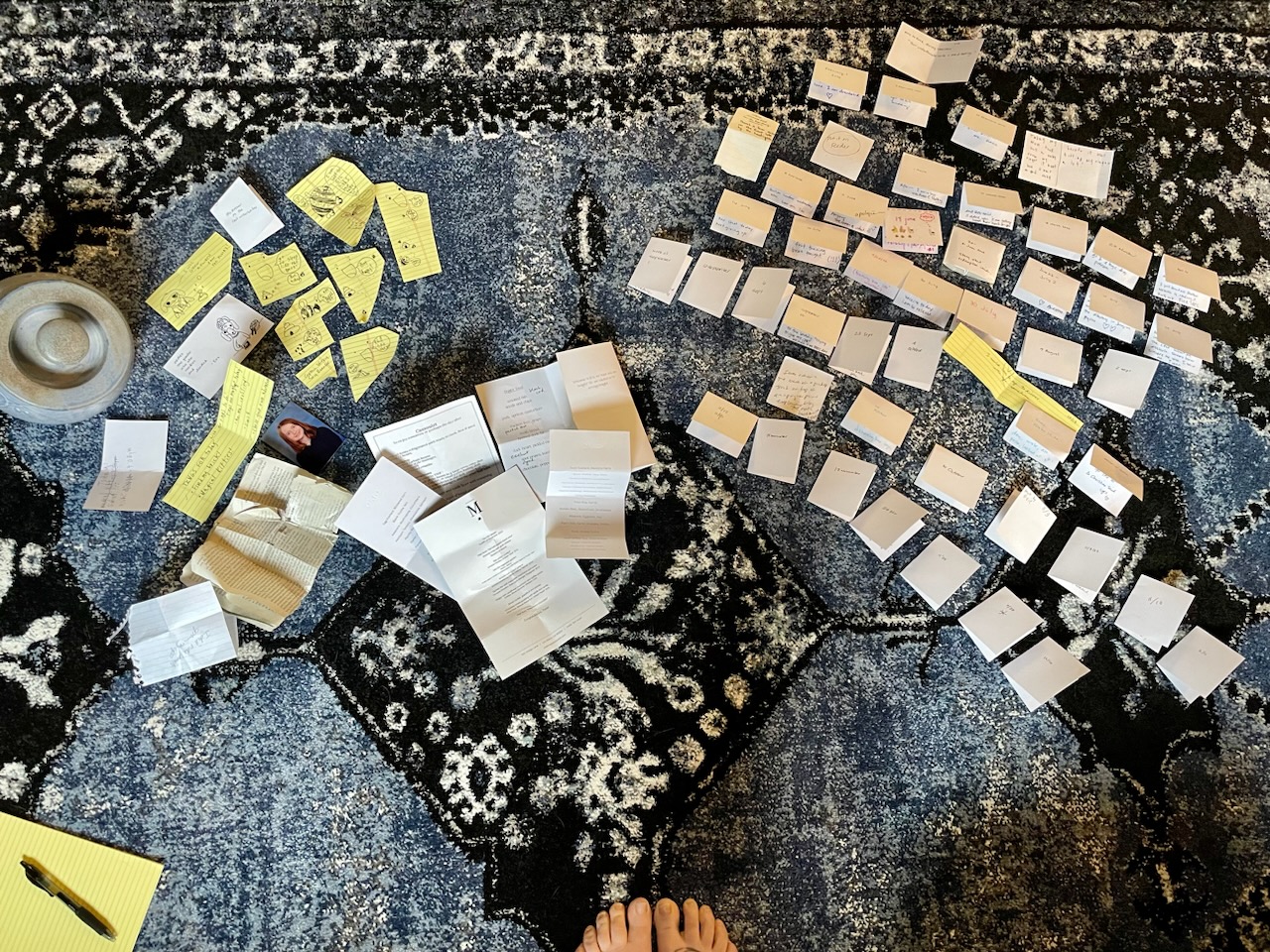“Take the goose, pull off the feathers, make a fire about her, not too close for smoke to choke her, or burn her too soon, not too far off so she may escape. Put small cups of water with salt and honey … also dishes apple sauce. Baste goose with butter. She will drunk water to relieve thirst, eat apples to cleanse and empty her of dung. Keep her head and heart wet with a sponge. When she gets giddy from running and begins to stumble, she is roasted enough. Take her up, set her before the guests: she will cry as you cut off any part and will be almost eaten before she is dead … It is lightly pleasant to behold.” From Wesker’s Secrets of Nature, as quoted in “How to Make a Pigeon Cry,” by M.F.K. Fisher.
The kitchen windows in my apartment faced north and west; a big plant-filled room with high ceilings and wide, single-hung windows which I left thrown open to let in the breeze and the din of the city three stories below. My view, while doing dishes, was the side of an apartment building across an alley so narrow that I could read the subtitles on my neighbor’s television. The siding had grayed from white, and was spattered with pigeon shit; birds roosted on the flat roof. A horizontal gutter ran the length of that building; the building was very old and the gutters were wood, which eventually someone had lidded with panels of aluminum. Over time one of the sheets of metal corroded and lifted, like the dogeared page of a book, making an opening into the gutter itself.
The broken-out spot in the gutter created a doorway inside; the aluminum a kind of roof. In late May, pigeons investigated it. They went in; I could see them. Then, the next day, one of them stayed in the little gutter-house and the other flew back and forth, bringing twigs and grasses and sometimes bits of twine. The bird who had stayed, the female, arranged and rearranged everything underneath herself to build the nest. Together they worked for the latter part of the week. And then, suddenly, there were two plain white eggs. I set the step stool in front of the dishwasher so my five-year old daughter could climb up and see the nest, and the eggs. One of my cats, lithe and sleek, leapt up to the counter to look, too. The other cat, blessed with four legs but only three paws, sat on the floor, flicking his tail, waiting for news. I researched pigeon incubation, and on our paper calendar on the kitchen wall, I counted out eighteen days and circled the date.
Both eggs hatched exactly on schedule; my daughter and I watched. The squabs peeped incessantly, one could hear them from everywhere in the house. They looked almost like ducks: their heads were so small; tufted pale gray on top and darker around the face and eyes, and their beaks were proportionally huge, like bills. They arranged and rearranged themselves when their mother was out of the nest. Within days they grew plush with down. Always peeping faintly, like distant music. They huddled together. The sun slanted across my kitchen. In the patterns of sunlight, abstract leaf-shadows flickered and swayed; it was hot, almost summer. There was a breeze in the branches of the elms and maples; the leaves sharp green outside against the brilliant sky.
My three-pawed cat jumped and scrabbled and twisted and fell with a thud maybe a hundred times, trying to get up. Finally, he made it to the counter. Hesitant about punishing his discipline, I let him stay. But then, the two cats watched the pigeons together, side by side, tails twitching, emitting the guttural clicking sounds of predators; like men leering from a car window to hiss lewd things.
When the squabs were a few weeks old, I boarded a plane for Montana. I wore a red gown: a rich, billowy linen-crepe; floor-length. The top was a halter, a deep V, the long strings tied at the nape of my neck. The strings hung most of the way down my back; they had tiny bells sewn to the ends. It was too elegant for a noon flight, and too elegant especially to wear in coach. I was flying to join my long-distance boyfriend; celebrating his 40th birthday, meeting his extended family. His parents had rented an entire restaurant. At the party, my boyfriend and I stood at the front of the room, holding hands, while his family told stories about his childhood and wild adolescence. I looked down at our fingers intertwined between us; his hand resting against the leg of his jeans, thick and paw-like, tattooed, covered with faint scars: burns and cuts from the kitchen. My hand was smaller, pale, equally tattooed, and it almost disappeared in his grip; my skin luminescent against the background of my red dress.
We drove across town to a bar to meet his friends. I was tipsy and tired, and I hardly knew Billings even though I had visited every month for a year; somehow since childhood I have retained my terrible sense of direction. Inside the venue, a beer hall, it was dark and loud and humid. I let my eyes adjust. There was a performer on stage, and all at once I realized I knew who he was; he was, in fact, famous. In a drunken, dream-like state, I walked up to the stage. People were not paying attention to the music, which was soulful and lyrical Americana; there was loud talking and the cracking of balls colliding against each other on the pool tables. I was out of place. The musician, too, seemed out of place. I stood at the stage and listened to him croon and finger-pick his guitar strings as though it were a harp; I had seen him perform before, but never so close-up. It was after midnight. I hadn’t had anything more to drink, but I felt too drunk and too tired and everything was too much; and where was my boyfriend?
I wandered until I found him; he put his arm around me. He was talking to some friends.
I whispered, “I’m ready to go home.”
“Just give me ten minutes to say goodbye to everyone,” he said.
I nodded, and waited, leaning against him.
But ten minutes later, he was having the same conversation, with the same people.
I said, “Can we please go home?”
He said, “Five minutes.”
I walked back to the stage; the band packed up. I went to the bathroom and washed my hands; the light was wan and the room too hot. When I came back, my boyfriend was still talking to the same people.
“I need to go home,” I said, faintly. It was his party: I understood. It had been a long day for me.
“Almost ready,” he said, without even glancing over. This, too, I understood.
I turned in a mild, measured way, and walked out of the building. The night was warm, the dark sky clear and endless. I crossed the parking lot and began to run down the sidewalk; it felt good to run. As I ran, I gathered the skirt of my dress in my hands, and then draped it over one arm so it was out of my way. The air felt cool on my skin. Everything was very quiet; just my breath and the tender slap of my sandals on the pavement, and the tinging of the little bells as they bounced against my back. I turned right, into a neighborhood, looking up at the waning moon. I slowed to a walk and let the bottom of the dress cascade off my arm and hang at its full length. I had once been taken to a stranger’s wedding party; the three-tiered wedding-cake was frosted handsomely in pure white, but the cake inside was red velvet; someone whispered that it was a shotgun wedding, an ultimatum to the loose daughter. I looked up. A blue glint in the sky: Venus; she had sent doves to guide Aeneas to the golden bough. She sent pigeons.
There was a dim alleyway between two apartment houses, and a porch light illuminated a stoop halfway down the length of them. I walked between the two buildings; the red hem of my dress dragged gently over the gravel. Everything was still. I could hear the lightbulb buzzing; there were cobwebs on it. A folding chair sat next to the door, under the light. I lowered myself into it, oh, it felt so cool on my skin and so good to rest, and I leaned back and looked up into the narrow band of sky between the two buildings; and there was Cassiopeia, shaped like a W; the throne, the queen.
The deadbolt clicked, the door next to me opened. A woman stepped out in her dressing gown; it was red nylon, and I could see her lace bra and panties through it. Her flame-orange hair had been set in curlers.
“Honey, you alright?” She asked.
I tilted my chin down and smiled; I was sitting drunk in this woman’s chair outside of her house in the middle of the night.
“I am,” I said, and then smiled up at her.
“You wanna come in and have a glass of water?” She asked.
“Yeah, I do,” I said, “thank you.”
I stood and followed her inside.
The front door opened directly on to the kitchen, which was in the front corner of the living room; it was one big open space. There were a couple of drab old couches with roller bags flung open on them, with outfits and lingerie and neon dresses spilling out. There were two other women; one was rolling up her pantyhose, the other applying mascara thickly. The first woman took a large blue plastic tumbler from the draining board and filled it with water from the tap and handed it to me.
“Thank you,” I said, and I gulped the water.
They were getting ready to go out, they were all in some state of undress. Ladies of the night, I thought, and grinned into my cup, fantastic. I felt rich beyond belief with the sheer pleasure of being alive; I had flown to Montana for my boyfriend’s fancy-restaurant birthday party and ended the night, drinking water, in a den of hookers. I finished my water. The woman led me back outside.
I walked back up the alley toward the street; I had decided that when I got to the next corner, I would phone my boyfriend, and ask him to please pick me up. Behind me, the woman was still in the doorway.
She yelled, “Now don’t you let no man treat you no good, you hear?”
I called back to her, over my shoulder, “No, ma’am, I won’t.”
I flew home to Portland the next day. I picked up my daughter, I unpacked, I started making dinner. Through the kitchen window, in the gutter, laid the empty nest; a pang. It had rained hard the night before, had they been flooded out? They could have fallen, or, a falcon… but within minutes they both soared into sight and landed. They could fly. The new pigeons perched on the broken edge of their roof, examining the world. Pigeon, dove; feral, wild: they are among the strongest fliers of all birds; muscle and movement, messengers of love and of war. I called to my daughter, Come look!
The pigeons stayed through the season; they stayed the year. They brought other pigeons, until the entire length of the gutter was a-chatter with the sound of their scratching claws and flapping wings and their cooing. Finally, the building maintenance person from next door came with a ladder and piece of wood and boarded up the hole. And then, for a while, the pigeons were gone.
Now it is the perfect size for the sparrows, who have already built their nest.
Author: `aqaq`
Tasia Bernie is an essayist, and editor of FeederPDX.com. She enjoys used bookstores, offal, and hard laughter. She is a very good eater. She lives with her daughter and two orange cats in Portland, Oregon.




